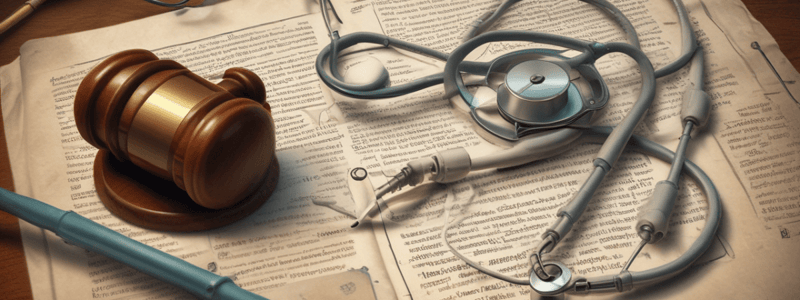Podcast
Questions and Answers
What is the primary purpose of a patient's 'Bill of Rights'?
What is the primary purpose of a patient's 'Bill of Rights'?
- To establish guidelines for patient care and treatment
- To provide a framework for resolving conflicts between patients and healthcare providers
- To inform patients of their rights and responsibilities in a healthcare setting (correct)
- To outline the legal obligations of healthcare professionals
Which of the following laws is primarily concerned with protecting patient confidentiality?
Which of the following laws is primarily concerned with protecting patient confidentiality?
- FMLA
- OSHA
- HIPAA (correct)
- ADA
What is the primary purpose of Material Data Safety Sheets (MSDS) in a healthcare setting?
What is the primary purpose of Material Data Safety Sheets (MSDS) in a healthcare setting?
- To provide information on patient medications
- To outline procedures for emergency response
- To provide information on the safe handling and use of hazardous materials (correct)
- To establish guidelines for infection control
What type of consent is implied when a patient presents to a healthcare facility for treatment?
What type of consent is implied when a patient presents to a healthcare facility for treatment?
What is the primary purpose of licensure and certification for healthcare professionals?
What is the primary purpose of licensure and certification for healthcare professionals?
What is the main purpose of a healthcare facility's policies and procedures?
What is the main purpose of a healthcare facility's policies and procedures?
What is the primary purpose of standards set by HIPAA?
What is the primary purpose of standards set by HIPAA?
Which of the following is an example of a threat to patient confidentiality?
Which of the following is an example of a threat to patient confidentiality?
What is the primary purpose of expressed consent?
What is the primary purpose of expressed consent?
What is the primary purpose of licensure and certification for healthcare professionals?
What is the primary purpose of licensure and certification for healthcare professionals?
Which of the following is NOT a standard associated with employment and labor?
Which of the following is NOT a standard associated with employment and labor?
What is the primary purpose of identifying national, state, and local standards for workplace safety?
What is the primary purpose of identifying national, state, and local standards for workplace safety?
Which of the following is an ethical issue related to healthcare?
Which of the following is an ethical issue related to healthcare?
What is the primary purpose of determining laws governing healthcare professionals?
What is the primary purpose of determining laws governing healthcare professionals?
Which of the following is an example of implied consent?
Which of the following is an example of implied consent?
What is the primary purpose of a healthcare facility's policies and procedures?
What is the primary purpose of a healthcare facility's policies and procedures?
Which of the following laws is primarily concerned with protecting patient confidentiality?
Which of the following laws is primarily concerned with protecting patient confidentiality?
What is the purpose of identifying national, state, and local standards for workplace safety?
What is the purpose of identifying national, state, and local standards for workplace safety?
What is the primary purpose of determining laws governing healthcare professionals?
What is the primary purpose of determining laws governing healthcare professionals?
Which of the following practices or behaviors is an example of negligence?
Which of the following practices or behaviors is an example of negligence?
Flashcards are hidden until you start studying
Study Notes
Legal and Ethical Issues in Healthcare
- Healthcare facilities have policies and procedures that need to be stated and followed.
Workplace Safety
- National, state, and local standards exist to ensure workplace safety in healthcare settings.
Governance of Healthcare Professionals
- Laws govern the practice of healthcare professionals, outlining their responsibilities and accountabilities.
Patient Rights
- A patient's "Bill of Rights" exists to protect and inform patients of their rights and expectations.
Employment and Labor
- Laws and standards associated with employment and labor in healthcare settings aim to protect employees' rights and ensure fair labor practices.
Hazardous Materials
- Material Data Safety Sheets (MSDS) are used in healthcare settings to ensure the safe handling and use of hazardous materials.
Harassment
- Laws prohibit harassment in healthcare workplaces, promoting a safe and respectful work environment.
Professional Qualifications
- Healthcare professionals require licensure and certification to practice, ensuring competence and quality care.
Patient Data Protection
- The Health Insurance Portability and Accountability Act (HIPAA) sets standards for protecting patient data and maintaining confidentiality.
Confidentiality
- Patient confidentiality is essential, and maintaining it is crucial in healthcare settings.
- Threats to patient confidentiality exist and must be identified and mitigated.
Informed Consent
- Expressed, implied, and informed consent are essential for patients to make informed decisions about their care.
Malpractice and Liability
- Malpractice, liability, and negligence can result from unacceptable practices and behaviors, posing risks to patients and healthcare professionals.
Ethical Considerations
- Ethical issues arise in healthcare, requiring professionals to navigate complex moral dilemmas and make sound judgments.
Legal and Ethical Issues in Healthcare
- Healthcare facilities have policies and procedures that need to be stated and followed.
Workplace Safety
- National, state, and local standards exist to ensure workplace safety in healthcare settings.
Governance of Healthcare Professionals
- Laws govern the practice of healthcare professionals, outlining their responsibilities and accountabilities.
Patient Rights
- A patient's "Bill of Rights" exists to protect and inform patients of their rights and expectations.
Employment and Labor
- Laws and standards associated with employment and labor in healthcare settings aim to protect employees' rights and ensure fair labor practices.
Hazardous Materials
- Material Data Safety Sheets (MSDS) are used in healthcare settings to ensure the safe handling and use of hazardous materials.
Harassment
- Laws prohibit harassment in healthcare workplaces, promoting a safe and respectful work environment.
Professional Qualifications
- Healthcare professionals require licensure and certification to practice, ensuring competence and quality care.
Patient Data Protection
- The Health Insurance Portability and Accountability Act (HIPAA) sets standards for protecting patient data and maintaining confidentiality.
Confidentiality
- Patient confidentiality is essential, and maintaining it is crucial in healthcare settings.
- Threats to patient confidentiality exist and must be identified and mitigated.
Informed Consent
- Expressed, implied, and informed consent are essential for patients to make informed decisions about their care.
Malpractice and Liability
- Malpractice, liability, and negligence can result from unacceptable practices and behaviors, posing risks to patients and healthcare professionals.
Ethical Considerations
- Ethical issues arise in healthcare, requiring professionals to navigate complex moral dilemmas and make sound judgments.
Legal and Ethical Issues in Healthcare
- Healthcare facilities have policies and procedures that need to be stated and followed.
Workplace Safety
- National, state, and local standards exist to ensure workplace safety in healthcare settings.
Governance of Healthcare Professionals
- Laws govern the practice of healthcare professionals, outlining their responsibilities and accountabilities.
Patient Rights
- A patient's "Bill of Rights" exists to protect and inform patients of their rights and expectations.
Employment and Labor
- Laws and standards associated with employment and labor in healthcare settings aim to protect employees' rights and ensure fair labor practices.
Hazardous Materials
- Material Data Safety Sheets (MSDS) are used in healthcare settings to ensure the safe handling and use of hazardous materials.
Harassment
- Laws prohibit harassment in healthcare workplaces, promoting a safe and respectful work environment.
Professional Qualifications
- Healthcare professionals require licensure and certification to practice, ensuring competence and quality care.
Patient Data Protection
- The Health Insurance Portability and Accountability Act (HIPAA) sets standards for protecting patient data and maintaining confidentiality.
Confidentiality
- Patient confidentiality is essential, and maintaining it is crucial in healthcare settings.
- Threats to patient confidentiality exist and must be identified and mitigated.
Informed Consent
- Expressed, implied, and informed consent are essential for patients to make informed decisions about their care.
Malpractice and Liability
- Malpractice, liability, and negligence can result from unacceptable practices and behaviors, posing risks to patients and healthcare professionals.
Ethical Considerations
- Ethical issues arise in healthcare, requiring professionals to navigate complex moral dilemmas and make sound judgments.
Legal and Ethical Issues in Healthcare
- Healthcare facilities have policies and procedures that need to be stated and followed.
Workplace Safety
- National, state, and local standards exist to ensure workplace safety in healthcare settings.
Governance of Healthcare Professionals
- Laws govern the practice of healthcare professionals, outlining their responsibilities and accountabilities.
Patient Rights
- A patient's "Bill of Rights" exists to protect and inform patients of their rights and expectations.
Employment and Labor
- Laws and standards associated with employment and labor in healthcare settings aim to protect employees' rights and ensure fair labor practices.
Hazardous Materials
- Material Data Safety Sheets (MSDS) are used in healthcare settings to ensure the safe handling and use of hazardous materials.
Harassment
- Laws prohibit harassment in healthcare workplaces, promoting a safe and respectful work environment.
Professional Qualifications
- Healthcare professionals require licensure and certification to practice, ensuring competence and quality care.
Patient Data Protection
- The Health Insurance Portability and Accountability Act (HIPAA) sets standards for protecting patient data and maintaining confidentiality.
Confidentiality
- Patient confidentiality is essential, and maintaining it is crucial in healthcare settings.
- Threats to patient confidentiality exist and must be identified and mitigated.
Informed Consent
- Expressed, implied, and informed consent are essential for patients to make informed decisions about their care.
Malpractice and Liability
- Malpractice, liability, and negligence can result from unacceptable practices and behaviors, posing risks to patients and healthcare professionals.
Ethical Considerations
- Ethical issues arise in healthcare, requiring professionals to navigate complex moral dilemmas and make sound judgments.
Studying That Suits You
Use AI to generate personalized quizzes and flashcards to suit your learning preferences.




